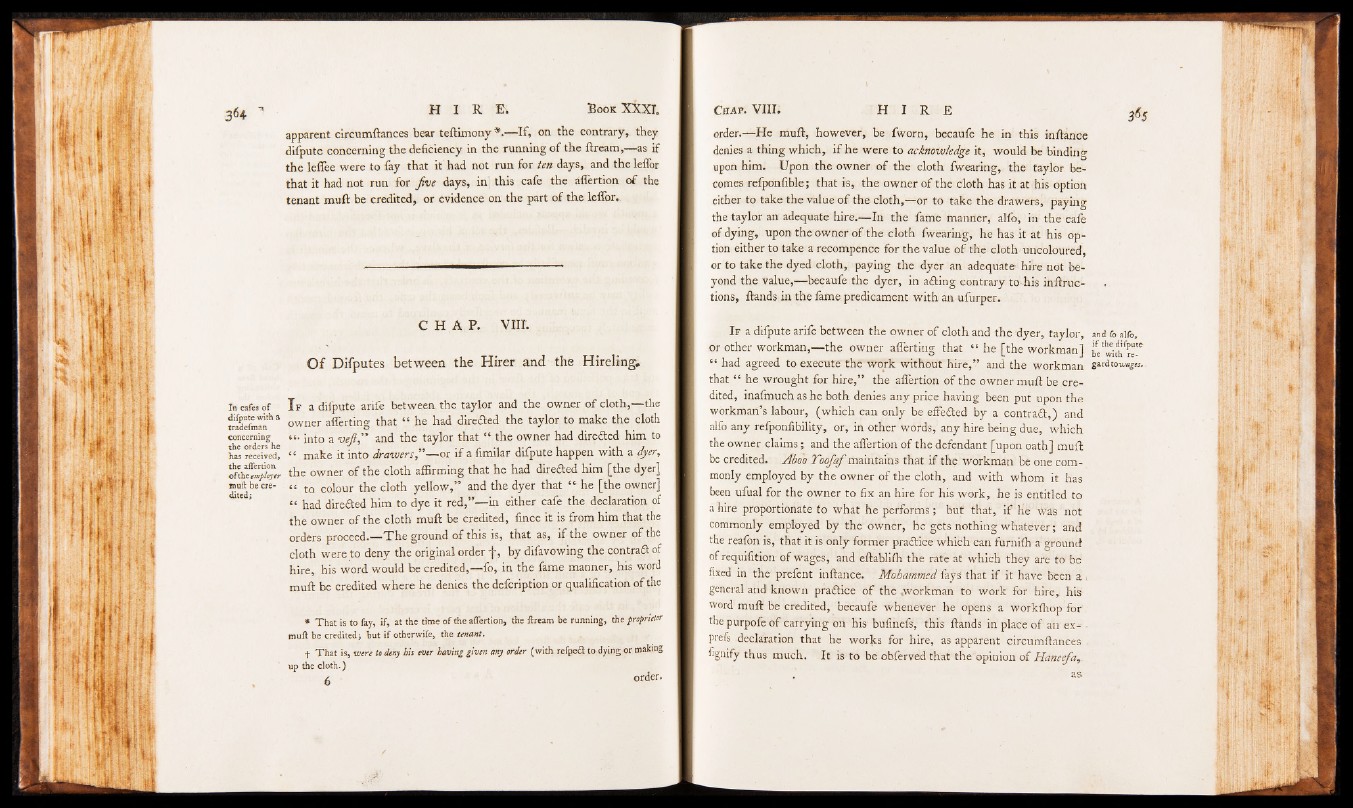
In cafes o f
difpute with a
tradefman
concerning
the orders he
has received,
the affertion
o f the employer
muft be credited;
apparent circumftances bear teftimony * .— If, on the contrary, they
difpute concerning the deficiency in the running of the ftream,— as if
the leflee were to fay that it had not run for ten days, and the leffor
that it had not run for fiv e days, in] this cafe the afiertion of the
tenant muft be credited, or evidence on the part of the leffor.
C H A P . VIII.
Of Difputes between the Hirer and the Hireling.
I f a difpute arife between the taylor and the owner of cloth,— the
owner aflerting that “ he had directed the taylor to make the cloth
“ • into a v efi," and the taylor that “ the owner had directed him to
“ make it into drawers,”— or if a fimilar difpute happen with a dyer,
the owner of the cloth affirming that he had dire&ed him [the dyer]
“ to colour the cloth yellow,” and the dyer that “ he [the owner]
“ had dire&ed him to dye it red,”— in either cafe the declaration of
the owner of the cloth muft be credited, fince it is from him that the
orders proceed.— T h e ground of this is, that as, if the owner of the
cloth were to deny the original order f , by difavowing the contrail of
hire, his word would be credited,— fo, in the fame manner, his word
muft be credited where he denies the defcription or qualification of the
* T h a t is to fay, if , at the time o f the afiertion, the ftream be running, the proprietor
muft be credited; but i f otherwife, the tenant.
■ f T h a t is , were to deny his ever having given any order (with refpcct to dying or making
up the cloth .)
6 order.
order.— He muft, however, be fworn, becaufe he in this inftance
denies a thing which, i f he were to acknowledge it, would be binding
upon him. Upon the owner of the cloth fwearing, the taylor becomes
refponfible; that is,, the owner of the cloth has it at his option
either to take the value o f the cloth,—or to take the drawers, payino-
the taylor an adequate hire.— In the fame manner, alfo, in the cafe
of dying, upon the owner of the cloth fwearing, he has it at his option
either to take a recompence for the value of the cloth urtcoloured,
or to take the dyed cloth, paying the dyer an adequate- hire not beyond
the value,— becaufe the dyer, in adting contrary to his inftruc-
tions, ftands in the fame predicament with an ufurper.
I f a difpute arife between the owner of cloth and the dyer, taylor, and fo alfo,
or other workman,— the owner afferting that “ he [the workman] be'wiih^e*
“ had agreed to execute the work without hire,” and the workman gardto-wages.
that “ he wrought for hire,” the afiertion of the owner muft be credited,
inafmuch as he both denies any price having been put upon the
workman’s labour, (which can only be effedted by a contradt,) and
alfo any refponfibility, or, in other words, any hire being due, which
the owner claims; and the afiertion of the defendant [upon oath] muft
be credited. Aboo Toofaf maintains that i f the workman be one commonly
employed by the owner of the cloth, and with whom it has
been ufual for the owner to fix an hire for his work, he is entitled to
a hire proportionate to what he performs; but that, i f lid ’Vitas'not
commonly employed by the owner, he gets nothing whatever; and
the reafon is, that it is only former pradtice which can furnifh a ground
of requifition of wages, and eftablifh the rate at which they are to be
fixed in the prefent inftance. Mohammed fayd that if it have been a I
general and known pradtice o f the .workman to work for hire, his
word muft be credited, becaufe whenever he opens a workfhop for’
thepurpofe of carrying on his bufinef^," 'this ftands in place of an ex- -
prefs -declaration that he works for hire, as apparent circumftances, .
fignify thus much. It is to be obferved that the opinion of Hdneefa,.
as